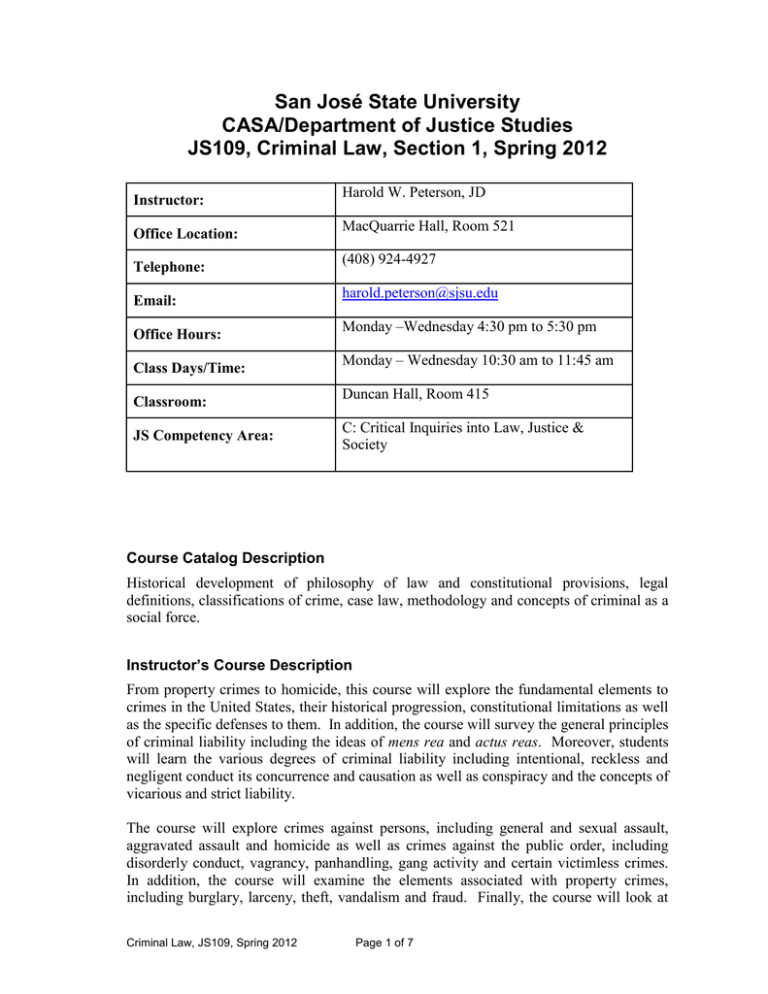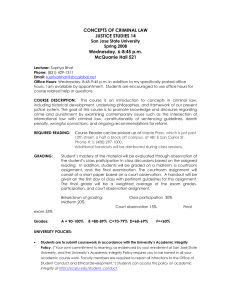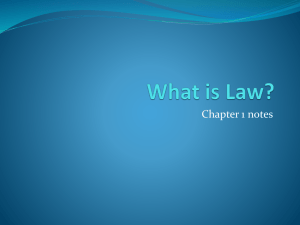San José State University CASA/Department of Justice Studies
advertisement

San José State University CASA/Department of Justice Studies JS109, Criminal Law, Section 1, Spring 2012 Instructor: Office Location: Telephone: Email: Office Hours: Class Days/Time: Classroom: JS Competency Area: Harold W. Peterson, JD MacQuarrie Hall, Room 521 (408) 924-4927 harold.peterson@sjsu.edu Monday –Wednesday 4:30 pm to 5:30 pm Monday – Wednesday 10:30 am to 11:45 am Duncan Hall, Room 415 C: Critical Inquiries into Law, Justice & Society Course Catalog Description Historical development of philosophy of law and constitutional provisions, legal definitions, classifications of crime, case law, methodology and concepts of criminal as a social force. Instructor’s Course Description From property crimes to homicide, this course will explore the fundamental elements to crimes in the United States, their historical progression, constitutional limitations as well as the specific defenses to them. In addition, the course will survey the general principles of criminal liability including the ideas of mens rea and actus reas. Moreover, students will learn the various degrees of criminal liability including intentional, reckless and negligent conduct its concurrence and causation as well as conspiracy and the concepts of vicarious and strict liability. The course will explore crimes against persons, including general and sexual assault, aggravated assault and homicide as well as crimes against the public order, including disorderly conduct, vagrancy, panhandling, gang activity and certain victimless crimes. In addition, the course will examine the elements associated with property crimes, including burglary, larceny, theft, vandalism and fraud. Finally, the course will look at Criminal Law, JS109, Spring 2012 Page 1 of 7 various crimes against the government, including treason, sedition, sabotage, espionage and terrorism. 1. Historical Perspective: The course will survey the historical components to specific crimes in the United States as well as a chronological review of statutory and case law associated with such crimes. 2. Legal Analysis: The course will provide an analytical review of the basic elements of specific crimes pursuant to federal and state statutes and the common law, specifically the evolution and interpretation of such law by the US Supreme Court and the state courts. In addition, the analysis will include an indepth look at the reasons and justifications that shape the court’s opinions and how these opinions ultimately define criminal law in the United States. 3. Discussion: The course will facilitate discussion of issues concerning criminal law, crimes and the development of such law within the criminal justice system. Course Goals and Student Learning Objectives Upon successful completion of this course, students will be able to: SLO 1 - Articulate the nature and limits of criminal law in the United States. SLO 2 - Understand the Constitutional limitations regarding criminal law such as the void-for-vagueness and Equal Protections doctrines. SLO 3 - Understand concepts of mens rea and actus reas. SLO 4 - Apply the principles of causation, concurrence and vicarious liability to certain fact situations. SLO 5 - Master the elements of specific crimes against persons and property as well as defenses to such crimes. SLO 6 - Brief cases from the textbook in a format that identifies the facts, legal issues, holdings and the court’s findings. Required Texts/Readings Textbook Anderson, T. M. & Gardner, T. J. & (2012) (11Th ed). Criminal Law. Belmont, CA: Wadsworth. The text is available at the campus bookstore. Supplemental readings assigned by topic and held on e-reserve at the library. In addition, the Criminal Law, JS109, Spring 2012 Page 1 of 7 textbook publisher provides www.wadsworth.com. ISBN: 978-49591337-5 supplementary internet resources at Library Liaison Nyle Monday Senior Assistant Librarian, University Library, San Jose State University Email nyle.monday@sjsu.edu Classroom Protocol This is a time to open your minds to new ideas, to explore new concepts, so please take advantage of this opportunity. Further, please be respectful of others and show them common courtesy. Students may enrich the learning process by discussion. Respect and professionalism are the guiding principles of this class. Tardiness will not be tolerated, if you are late, do not disturb class—wait until break to enter the classroom. Electronic Devices: Please turn off all cell phones, pages, PDA’s or any other electronic device that “make noise”. No text messaging in class, please turn off these devices, as they are disruptive. Students may take hand written notes during class; however, students may not use computer and/or other recording devices. Dropping and Adding Students are responsible for understanding the policies and procedures about add/drops, academic renewal, etc. Information on add/drops are available at http://info.sjsu.edu/webdbgen/narr/soc-fall/rec-298.html. Information about late drop is available at http://www.sjsu.edu/sac/advising/latedrops/policy/ . Students should be aware of the current deadlines and penalties for adding and dropping classes. Assignments and Grading Policy A student’s final evaluation shall consist of two (2) in-class midterm examinations, five (5) short essay assignments and a final examination. Points and percentage of overall evaluation: Examination and Evaluation: Grade Item First Midterm Examination (SLO’s 1-3, 5) Second Midterm Examination (SLO’s 1-5) 4 Short Essay Assignments (SLO 6) Class Participation Final Examination (SLO’s 1-6) Total Criminal Law, JS109, Spring 2012 Page 1 of 7 Weight 25% 25% 15% 5% 30% 100% Points 100 100 60 20 120 400 Examinations consist of multiple choice, short answer and essay questions derived from the reading assignments and class lecture. Missed exams or assignments may only be made-up with proper documentation of illness, incapacity and/or prior and valid notification and reason for absence. Points for class participation are at the discretion of the instructor and may be added or withdrawn at any time before a student’s final evaluation. This course will be using the +/- system on final grades based on the following percentages: +/- Grading: 95-100: 90-94: 87-89: 84-86: 80-83: 77-79: A AB+ B BC+ 74-76: 70-73: 67-69: 64-66: 60-63: 0-59: C CD+ D DF Please note, a “C” or higher is required to receive credit for this course toward a Justice Studies or Forensic Science Major. To receive a grade for this course, students must complete all course requirements. Failure to complete any of them may result in a failing grade for the course. Students may dispute assignment, examination and course grades at the instructor’s convenience (or during office hours). It is important to note, however, that upon review, the instructor reserves the right to increase as well as decrease the grade in question. Students must submit all assignments online at the Desire2Learn website under the Dropbox menu. Instructor will not accept late assignments. University Policies Academic integrity Students should know that the University’s Academic Integrity Policy is available at http://www.sa.sjsu.edu/download/judicial_affairs/Academic_Integrity_Policy_S07-2.pdf. Your own commitment to learning, as evidenced by your enrollment at San Jose State University and the University’s integrity policy, require you to be honest in all your academic course work. Faculty members are required to report all infractions to the office of Student Conduct and Ethical Development. The website for Student Conduct and Ethical Development is available at http://www.sa.sjsu.edu/judicial_affairs/index.html. The University will not tolerate instances of academic dishonesty. Cheating on exams or plagiarism (presenting the work of another as your own, or the use of another person’s ideas without giving proper credit) will result in a failing grade and sanctions by the University. Students must complete all assignments unless otherwise specified. If you would like to include in your assignment any material you have submitted, or plan to Criminal Law, JS109, Spring 2012 Page 1 of 7 submit for another class, please note that SJSU’s Academic Policy F06-1 requires approval of instructors. Campus Policy in Compliance with the American Disabilities Act If you need course adaptations or accommodations because of a disability, or if you need to make special arrangements in case of building evacuation, please make an appointment with me as soon as possible, or see me during office hours. Presidential Directive 97-03 requires that students with disabilities requesting accommodations must register with the DRC (Disability Resource Center) to establish a record of their disability. Student Technology Resources Computer labs for student use are available in the Academic Success Center located on the 1st floor of Clark Hall and on the 2nd floor of the Student Union. Additional computer labs may be available in your department/college. Computers are also available in the Martin Luther King Library. A wide variety of audio-visual equipment is available for student checkout from Media Services located in IRC 112. These items include digital and VHS camcorders, VHS and Beta video players, 16 mm, slide, overhead, DVD, CD, and audiotape players, sound systems, wireless microphones, projection screens and monitors. Learning Assistance Resource Center The Learning Assistance Resource Center (LARC) located in Room 600 in the Student Services Center assists students in the development of their full academic potential and motivates them to become self-directed learners. The center provides support services, such as skill assessment, individual or group tutorials, subject advising, learning assistance, summer academic preparation and basic skills development. The LARC website is located at http:/www.sjsu.edu/larc/. SJSU Writing Center The SJSU Writing Center located in Room 126 in Clark Hall offers a variety of resources to help students become better writers, including one-on-one tutoring sessions and numerous writing workshops. All of the services are free for SJSU students. The Writing Center website is located at http://www.sjsu.edu/writingcenter/about/staff//. Peer Mentor Center The Peer Mentor Program was eases the transition to SJSU by empowering students to help each other and themselves. Peer Mentors are among the best, brightest, and most diverse SJSU students. Peer Mentors are in the MUSE classrooms as well as available in the Peer Mentor Center located in the Academic Success Center in Clark Hall. Website of Peer Mentor Center is located at http://www.sjsu.edu/muse/peermentor/ . Criminal Law, JS109, Spring 2012 Page 1 of 7 CASA Student Success Center The Student Success Center located in MacQuarrie Hall, Room 533 (top floor) provides advising for undergraduate students majoring or interested in majoring in programs offered by CASA Departments and Schools. The Student Success Center provides general education advising, assistance with changing majors, answers to academic policy related questions, meetings with peer advisors and/or various regularly scheduled presentations and workshops. 408.924.2910 http://www.sjsu.edu/casa/ssc/. Criminal Law, JS109, Spring 2012 Page 1 of 7 JS109 / Criminal Law, Spring 2012 Course Schedule Week Date 1 Wednesday 1/22/12 2 Monday 1/30/12 Wednesday 2/1/12 3 Monday 2/6/12 Wednesday 2/8/12 4 Monday 2/13/12 Wednesday 2/15/12 5 Monday 2/20/12 Wednesday 2/22/12 6 Monday 2/27/12 Wednesday 2/29/12 7 Monday Readings, Assignments & Deadlines Reading: Text: Chapter 1 – Criminal Law: Purpose & Scope Lecture & Discussion: Introduction; Syllabus; Class Mechanics; Concepts of Criminal Law; Goals & Purposes; Permissible Scope Reading: Text: Chapter 1 – Criminal Law: Purpose & Scope (continued) Lecture & Discussion: Principles of “No Punishment without Law; Classification of Crimes; Constitutional Limitations of Crimes; and Sources of Criminal Law Reading: Text: Chapter 2 – Jurisdiction Lecture & Discussion: Federal Jurisdiction; International Jurisdiction; Military Jurisdiction; and Tribal – Native American Jurisdiction Reading: Text: Chapter 3 – Essential Elements of a Crime Lecture & Discussion: True Crimes & Strict Liability Crimes; Crimes Requiring Proof of Mental Fault; and Strict Liability Crimes Reading: Text: Chapter 3 – Essential Elements of a Crime (continued) Lecture & Discussion: Proximate Cause or Causation; Possession Alone; Presumption & Inferences Reading: Text: Chapter 4 – Criminal Liability Lecture & Discussion: Preliminary, Anticipatory & Inchoate Crimes; Parties to Principle Crimes; and Post Offense Crimes Reading: Text: Chapter 5 – Criminal Responsibility Lecture & Discussion: History of Criminal Responsibility; The Insanity Defense; Determining Insanity; Diminished Capacity; Competency to Stand Trial; and Corporate Liability Reading: Text: Chapter 6 – The Law Governing the Use of Force Lecture & Discussion: Self-Defense & Defense of Others; Force – Defense of Property; Force – Arrest; and Child Discipline Reading: Text: Chapter 7 – Other Criminal Defenses Lecture & Discussion: Affirmative Defenses; Immunity; Mistake or Ignorance of fact; and Intoxication or Drugged Condition as a Defense; Affirmative Defenses; Immunity; Mistake or Ignorance of fact; and Duress, Coercion & Compulsion Reading: Text: Chapter 7 – Other Criminal Defenses (continued) Lecture & Discussion: Necessity (Choice of Evils); Killing to Save Oneself; Acting under Another’s Authority; Double Jeopardy; Frame-up; Entrapment/Outrageous Government Conduct; “It wasn’t’ me!” Speedy Trial; and Statute of Limitations Reading: Text: Chapter 8 – Criminal Punishment Lecture & Discussion: History of Punishment; Constitutional Limitations on Punishment; Corporal Punishment; Capital Punishment; Incarceration; Fines; Forfeiture; and Career Criminals and Repeat Offenders First Midterm Examination Review Criminal Law, JS109, Spring 2012 Page 1 of 7 3/5/12 Wednesday 3/7/12 8 Monday 3/12/12 Wednesday 3/14/12 9 Monday 3/19/12 Wednesday 3/21/12 10 No Class 11 Monday 4/2/12 Wednesday 4/4/12 12 Monday 4/9/12 Wednesday 4/11/12 13 Monday 4/16/12 Wednesday 4/18/12 14 Monday 4/23/12 Wednesday 4/25/12 First Midterm Examination Reading: Text: Chapter 9 – Freedom of Speech Lecture & Discussion: Regulation of Speech; Clear & Present Danger; Obscenity; Inciting and Urging Unlawful Acts; Symbolic Speech; Threats of Violence; and Loud Noises or Nuisance Speech Reading: Text: Chapter 9 – Freedom of Speech (continued) Lecture & Discussion: Regulating Use (Public & Private Places); Obstruction of Law Enforcement; Public Nuisances (Civil & Criminal); Stalking; Crime on City Streets; Gun Ownership & Registration; Freedom of Religion; and Right to Privacy Reading: Text: Chapter 10 – Homicide Lecture & Discussion: Homicide in General; Corpus Delicti; Victim Alive? Defendant’s Unlawful Act; Causation; Murder; Manslaughter; Suicide, Assisted Suicide and Euthanasia Reading: Text: Chapter 11 – Crimes Against Persons Lecture & Discussion: Assault; Battery; Felonious & Aggravated Assault; Child Abuse & Neglect; Offenses Against Liberty of a Person; and Kidnapping Spring Recess Reading: Text: Chapter 11 – Crimes Against persons (continued) Lecture & Discussion: Family Violence; Workplace Violence; Road Rage; Violent Aggressive Driving; and Duty to Report Laws Second Midterm Examination Review Second Midterm Examination Reading: Text: Chapter 12 – Sex Crimes Lecture & Discussion: Sexual Relations; Rape & Sexual Assault; Statutory Rape; Incest; HIV and AIDS Related Crimes; Sex Offender Registration (Megan’s Law); and Civil Commitment of Sexually Dangerous Offenders Reading: Text: Chapter 12 – Sex Crimes (continued) Lecture & Discussion: Prostitution; Touching and Other Sexual Conduct; Child Exploitation & Pornography; Movies, Videos & Photographs; Voyeurism; and Harassment Reading: Text: Chapter 13 – Larceny (Theft) Lecture & Discussion: Property Concepts; Larceny; Shoplifting; Fraudulent Use of Credit Cards; and Check Violations Reading: Text: Chapter 14 – Robbery, Burglary & Related Crimes Lecture & Discussion: Robbery; Extortion; and Burglary Reading: Text: Chapter 15 – White Collar Crimes & Cyber Crimes Lecture & Discussion: White Collar Crimes; Fraud & Fraudulent Practices; Counterfeiting Money & Commercial Products; Computer & Cyber Crime; Trafficking Stolen Goods; Destroying or Damaging Property of Another; Criminal Law, JS109, Spring 2012 Page 1 of 7 15 Monday 4/30/12 Wednesday 5/2/12 16 Monday 5/7/12 Wednesday 5/9/12 17 Arson; and Product Tampering Reading: Text: Chapter 16 – Drug Abuse & Alcohol Related Crimes Lecture & Discussion: Drug Abuse; Drug Laws; and Alcohol Related Crimes Reading: Text: Chapter 17 - Terrorism Lecture & Discussion: Terrorism; Early Terrorism Attacks; Modern Terrorism; and Crimes Against Terrorism Reading: Text: Chapter 18 – Organized Crimes & Gangs Lecture & Discussion: Organized Crimes; Gangs; Federal & State Laws; Witness Protection Program; Witness Tampering; Money Laundering; and Other Crimes to Fight Organized Crime Reading: Text: Chapter 19 – Crimes By or Against the Government Lecture & Discussion: Immigration Laws; Contempt; Crimes by Public Officials; Crimes Against Government Monday 5/14/12 Final Examination Review Friday 5/18/12 Final Examination (9:45 am to 12:00 pm) Criminal Law, JS109, Spring 2012 Page 1 of 7


